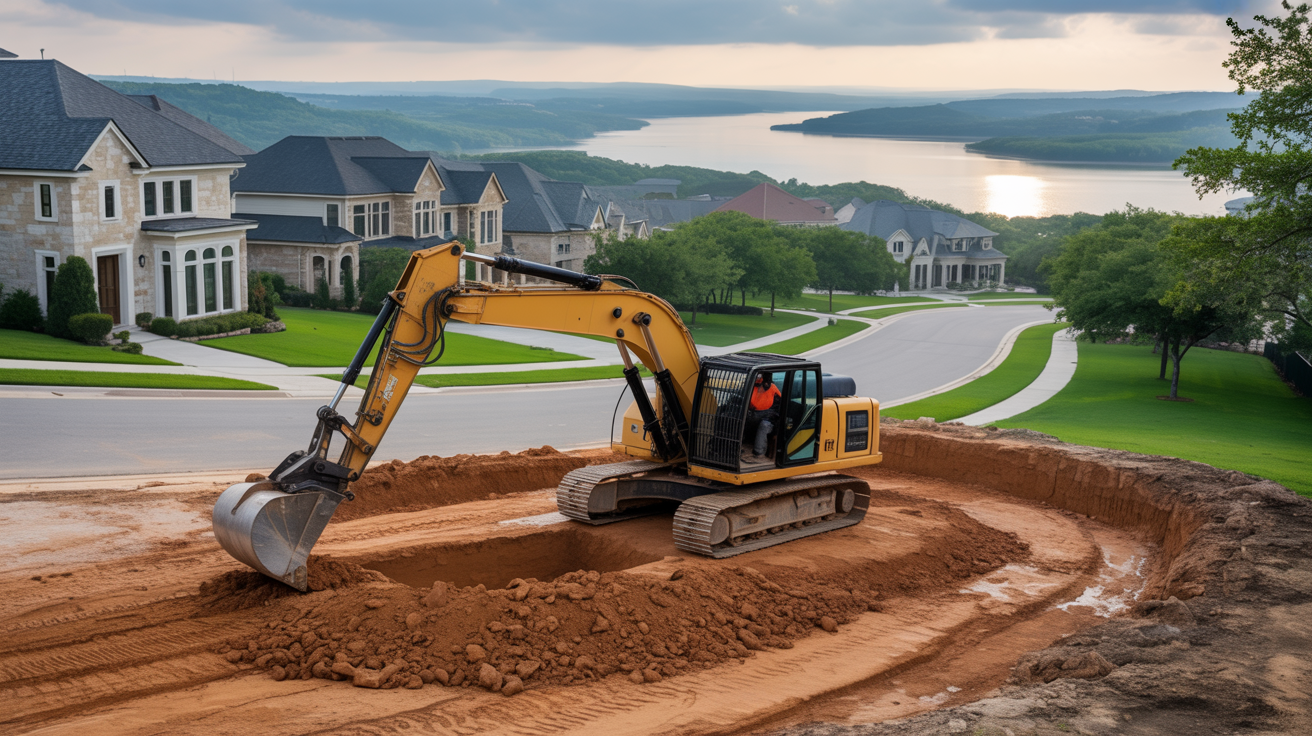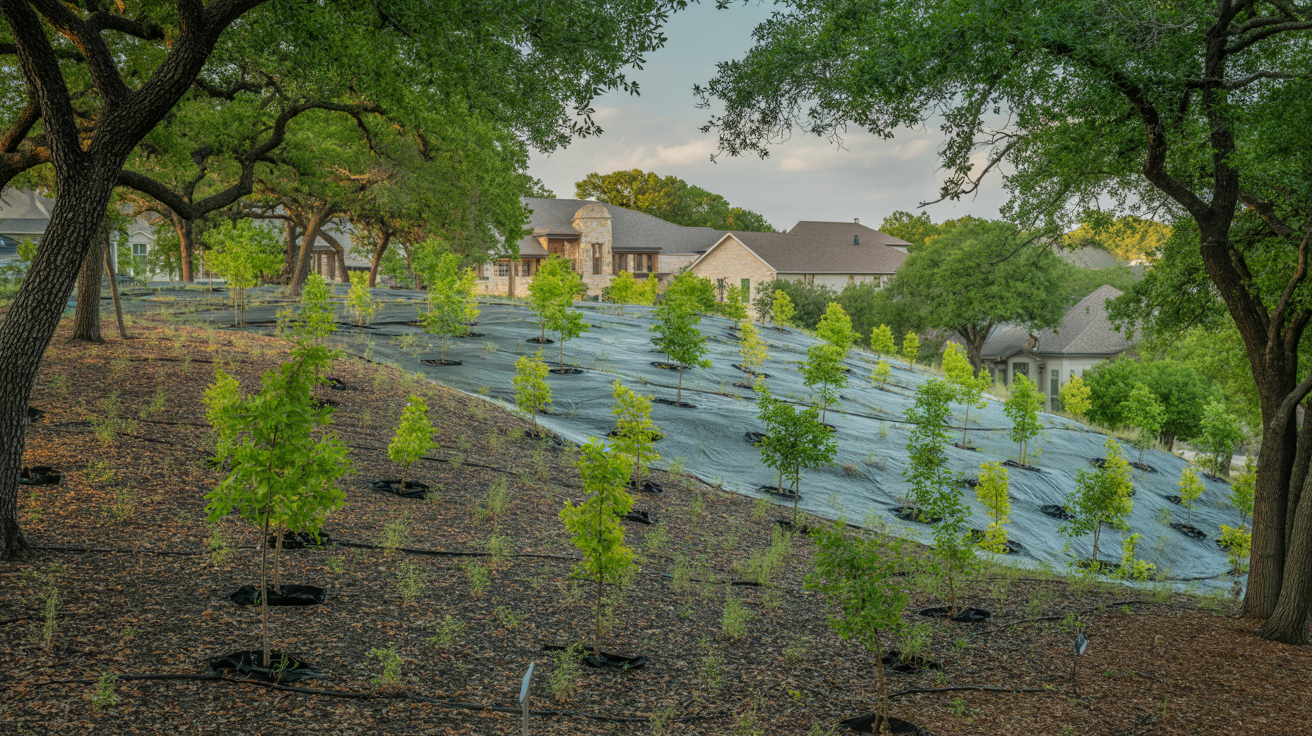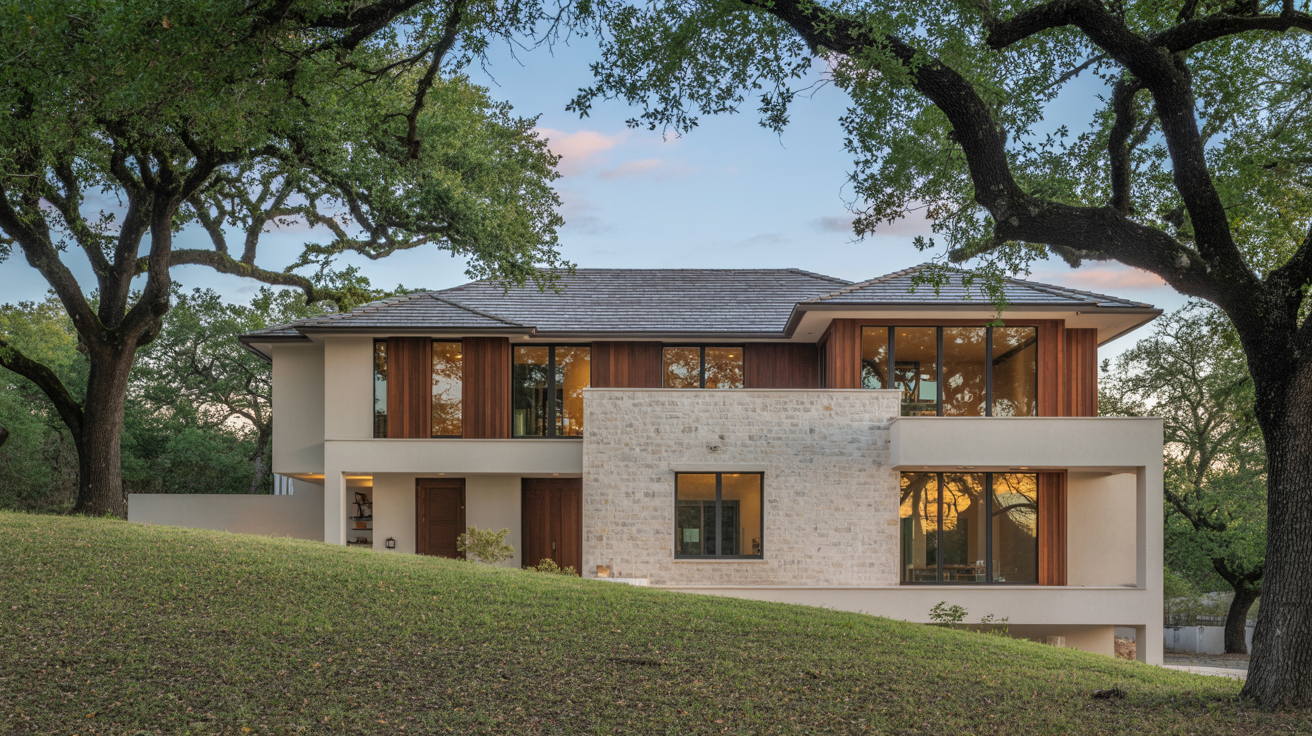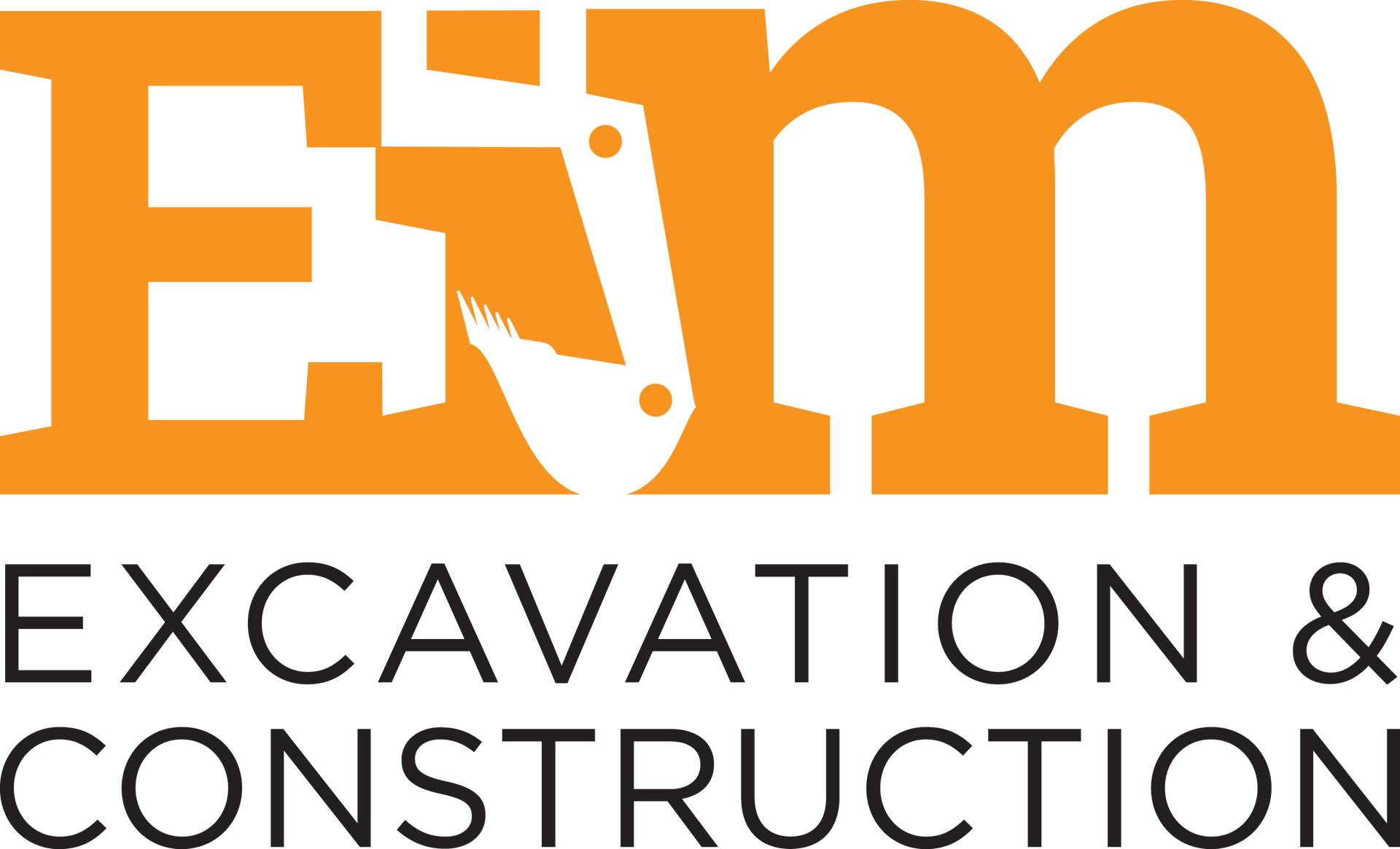Foundation Contractor in Lakeway
Foundation Contractor in Lakeway

Need a foundation contractor in Lakeway who understands what it means to build near one of Texas's most beautiful lakes? You've chosen to build or live in one of the most desirable communities in the Austin area, where Lake Travis creates a stunning backdrop for luxury homes and waterfront living. But here's what many people don't realize until they start dealing with foundation issues: building near the lake comes with unique challenges that require specialized knowledge and experience.
Lakeway isn't just another lakeside community. This is a place where million-dollar homes sit on carefully planned lots that take advantage of lake views while dealing with the complex soil and water conditions that come with proximity to a major body of water. The community has grown from a small resort town into one of the most sought-after addresses in Central Texas, but that growth has happened in an environment where foundation work requires special attention to detail.
The combination of Lake Travis's fluctuating water levels, the area's limestone geology, and the expansive clay soils that characterize much of Central Texas creates a perfect storm of foundation challenges. Add in the high property values and quality expectations that come with Lakeway's luxury market, and you quickly realize that choosing the right foundation contractor isn't just about getting the job done – it's about protecting a significant investment.
In this guide, we'll explore the unique foundation requirements that come with building in Lakeway, the services you can expect from professional contractors, and how to choose a team that understands both the technical challenges and the quality standards that make Lakeway special.
Lakeway's Unique Foundation Requirements
Lakeway's location on the shores of Lake Travis creates a unique set of conditions that affect foundation design and construction. Understanding these conditions is essential for anyone planning foundation work in this beautiful lakeside community.
Lake Proximity Effects
The proximity to Lake Travis affects foundation work in ways that many people don't initially consider. The lake's water levels fluctuate significantly based on rainfall, drought conditions, and water management decisions, and these fluctuations can affect groundwater levels and soil moisture conditions around foundations.
When Lake Travis is at full capacity, groundwater levels in nearby areas are typically higher, which can affect basement construction and create challenges for foundation excavation. During drought periods when the lake level drops significantly, groundwater levels also drop, which can cause clay soils to shrink and potentially affect foundation stability.
Foundation contractors in Lakeway need to understand these seasonal and long-term variations in water levels and design foundations that can accommodate changing conditions. This often requires more sophisticated drainage systems and moisture management techniques than would be needed in areas farther from the lake.
The lake's influence on local climate also affects foundation performance. The large body of water moderates temperature extremes and affects humidity levels, which can influence how quickly concrete cures and how building materials perform over time.
Waterfront properties face additional challenges related to erosion control and slope stability. Many Lakeway homes are built on sloped lots that take advantage of lake views, but these slopes require careful engineering to ensure long-term stability and prevent erosion that could affect foundation performance.
Soil Composition and Challenges
The soil conditions in Lakeway reflect the area's complex geological history and its position in the transition zone between the Edwards Plateau and the Blackland Prairie. This creates a varied soil profile that can present different challenges even within a single building site.
Much of Lakeway sits on limestone bedrock that provides excellent bearing capacity for foundations but can be expensive to excavate and may contain underground voids or caverns that affect foundation design. The limestone also affects drainage patterns and can create springs or seeps that need to be managed during foundation construction.
Clay soils are common in many parts of Lakeway, particularly in areas away from the immediate lakeshore. These soils can be highly expansive, meaning they swell when wet and shrink when dry. The proximity to Lake Travis can exacerbate these conditions because lake levels affect local groundwater and soil moisture levels.
The transition zones between different soil types can be particularly challenging for foundation work. A single building site might have limestone bedrock in one area and deep clay soils in another, requiring foundation designs that can accommodate these varying conditions.
Some areas of Lakeway also have sandy soils near the lakeshore that drain well but may require special foundation techniques to ensure adequate bearing capacity. These soils can be easier to excavate than clay or limestone but may require deeper foundations or special reinforcement to provide adequate support.
Climate Impact on Foundations
Lakeway's climate, moderated by the presence of Lake Travis, creates specific conditions that affect foundation performance and longevity. The lake's thermal mass helps moderate temperature extremes, but it also affects humidity levels and precipitation patterns in ways that impact foundation work.
The area's humidity levels, influenced by the large body of water, can affect concrete curing times and the performance of building materials. High humidity can slow concrete curing and create conditions that promote mold and mildew if proper ventilation isn't provided.
Lakeway's precipitation patterns are influenced by its location in the Hill Country and its proximity to Lake Travis. The area can experience intense rainfall events that create significant runoff and drainage challenges, particularly on the sloped lots that are common in the community.
Seasonal temperature variations, while moderated by the lake, still create expansion and contraction cycles that affect foundation materials.
Foundation contractors need to understand how these cycles affect different foundation types and materials over time.
The lake's influence on local wind patterns can also affect foundation work, particularly during construction when concrete is curing and when temporary structures are in place. Contractors need to plan for these conditions and take appropriate safety measures.
Foundation Services Available in Lakeway
Professional foundation contractors in Lakeway offer specialized services designed to address the unique challenges of building in this lakeside environment.
Foundation Installation
New foundation installation in Lakeway requires careful planning and execution to ensure long-term performance in the area's challenging conditions. This work begins with thorough site evaluation and soil testing to understand the specific conditions that will affect foundation design and construction.
Foundation contractors in Lakeway working on new installations need to understand how to design foundations that work with the area's varied soil conditions and changing water levels. This often requires more sophisticated engineering than would be needed in more stable environments.
The foundation installation process typically involves close coordination with structural engineers, geotechnical consultants, and sometimes environmental specialists who understand the lake's influence on local conditions. Contractors need to be able to implement complex foundation designs while maintaining construction efficiency and quality control.
Waterproofing and moisture management are particularly important for foundation installations in Lakeway. The area's proximity to Lake Travis and the potential for high groundwater levels require comprehensive waterproofing systems and drainage measures to prevent moisture problems.
Quality control during installation is critical because the challenging conditions in Lakeway leave little room for error. Contractors need to have rigorous inspection and testing procedures to ensure that foundations meet all design specifications and will perform well over time.
Repair and Restoration
Foundation repair work in Lakeway often involves addressing problems caused by the area's unique combination of soil conditions, water level fluctuations, and climate factors. These repairs can range from minor crack sealing to major structural work that requires extensive excavation and reconstruction.
Settlement issues are common in Lakeway due to the area's varied soil conditions and the effects of changing water levels on soil stability. Modern repair techniques like push piers, helical piers, and slab lifting can often address these problems without the expense and disruption of complete foundation replacement.
Moisture-related problems are also common in Lakeway due to the area's proximity to Lake Travis and the potential for high humidity and groundwater levels. Repair work often includes improving drainage systems, installing or upgrading waterproofing, and addressing ventilation issues that contribute to moisture problems.
Crack repair in Lakeway foundations requires understanding the underlying causes of the cracking, which can include soil movement, settlement, moisture changes, or thermal expansion and contraction. Effective repairs address both the symptoms and the root causes to prevent future problems.
Preventive Maintenance
Preventive maintenance is particularly important for foundations in Lakeway because the area's challenging conditions can accelerate foundation problems if they're not addressed promptly. Regular maintenance can help identify and address minor issues before they become major problems.
Drainage system maintenance is critical in Lakeway because the area's precipitation patterns and proximity to Lake Travis can create significant water management challenges. This includes cleaning gutters and downspouts, maintaining French drains and other subsurface drainage systems, and ensuring that surface grading directs water away from foundations.
Moisture monitoring is another important aspect of preventive maintenance in Lakeway. The area's humidity levels and potential for groundwater fluctuations require ongoing attention to moisture levels around foundations and in crawl spaces or basements.
Seasonal inspections are particularly valuable in Lakeway because the area's climate and water level variations can create changing conditions that affect foundation performance. Professional contractors can identify early warning signs of problems and recommend preventive measures.
For comprehensive foundation services that understand Lakeway's unique lakeside challenges, Austin area excavation and site preparation services can provide the specialized expertise needed for waterfront and near-waterfront properties.
Selecting a Foundation Contractor in Lakeway
Choosing the right foundation contractor for your Lakeway project requires understanding what makes this lakeside community unique and finding contractors who have the experience and expertise to handle its specific challenges.
Lake Area Experience
Experience working specifically in Lakeway and other Lake Travis communities is invaluable when selecting a foundation contractor. The conditions created by proximity to the lake are different from other parts of the Austin metro area, and contractors who understand these differences can provide better results and avoid costly mistakes.
Look for contractors who can provide references from other Lakeway projects and who demonstrate understanding of lake-related conditions during initial consultations. They should be able to discuss how Lake Travis's water level fluctuations affect foundation work, the importance of proper drainage design near the lake, and the special considerations that apply to waterfront properties.
Lake area experience also includes understanding the permitting and regulatory requirements that apply to construction near Lake Travis. The lake is subject to various environmental regulations, and construction projects may need to comply with additional requirements related to water quality protection and erosion control.
The best foundation contractors in Lakeway also understand the community's character and the quality expectations that come with the area's luxury market. This is a place where property values are high and residents expect work that enhances rather than detracts from their investment.
Specialized Techniques and Materials
Working in Lakeway's challenging environment requires specialized techniques and materials that not all foundation contractors possess. Look for contractors who have experience with advanced waterproofing systems, specialized drainage techniques, and foundation materials that perform well in high-moisture environments.
Waterproofing expertise is particularly important for foundation work in Lakeway. Contractors should be familiar with modern waterproofing membranes, drainage systems, and moisture management techniques that can handle the area's challenging conditions.
The equipment should be appropriate for working in Lakeway's varied terrain and soil conditions. This includes equipment for working with limestone bedrock, specialized compaction equipment for clay soils, and dewatering equipment for managing groundwater during excavation.
Modern foundation techniques like helical piers, push piers, and polyurethane injection systems can be particularly valuable in Lakeway's challenging conditions. Contractors should be familiar with these techniques and understand when each is most appropriate for specific situations.
Insurance and Licensing
All foundation contractors working in Lakeway should be properly licensed and insured, but the area's high property values and challenging conditions make this even more important than in other areas. Look for contractors who carry comprehensive liability insurance appropriate for the value of properties they're working on.
Professional liability insurance is particularly important for foundation work in challenging conditions like those found in Lakeway. This coverage protects both the contractor and the property owner if design or construction errors lead to foundation problems.
Workers' compensation coverage is essential because foundation work involves significant safety risks, particularly when working near water or on sloped terrain. Make sure any contractor you consider carries adequate workers' compensation insurance.
Bonding can provide additional protection for large or complex foundation projects. While not always required, bonding demonstrates the contractor's financial stability and provides recourse if they fail to complete work according to contract terms.
Common Foundation Issues in Lakeway
Understanding the types of foundation problems that commonly occur in Lakeway can help you recognize early warning signs and take appropriate action to prevent minor issues from becoming major problems.
Settlement and Shifting
Foundation settlement is a common issue in Lakeway due to the area's varied soil conditions and the effects of changing water levels on soil stability. Settlement can occur when foundations are built on inadequately prepared soils or when soil conditions change over time due to drought, flooding, or other factors.
Differential settlement, where different parts of a foundation settle at different rates, is particularly problematic because it can cause structural stress and cracking. This type of settlement is common in Lakeway because of the varied soil conditions that can exist even within a single building site.
Soil shifting due to expansive clay behavior is another common cause of foundation problems in Lakeway. Clay soils that expand when wet and contract when dry can create significant forces that affect foundation stability, particularly when moisture levels change due to Lake Travis water level fluctuations.
Erosion-related settlement can occur on sloped lots near Lake Travis, where surface water runoff or groundwater movement can gradually remove soil from around foundation elements. This type of settlement requires both foundation repair and erosion control measures to prevent future problems.
Water Damage and Moisture
Moisture-related foundation problems are common in Lakeway due to the area's proximity to Lake Travis and the potential for high humidity and groundwater levels. These problems can range from minor moisture infiltration to serious water damage that affects structural integrity.
Basement and crawl space moisture problems are particularly common in Lakeway because of the area's groundwater conditions and humidity levels. Poor ventilation, inadequate waterproofing, or drainage problems can create conditions that promote mold, mildew, and wood rot.
Hydrostatic pressure from groundwater can affect basement walls and below-grade foundation elements, particularly during periods when Lake Travis levels are high. This pressure can cause foundation walls to bow or crack and can force water through foundation materials.
Surface water infiltration around foundations can occur when drainage systems are inadequate or when grading directs water toward rather than away from foundations. This is particularly problematic on sloped lots where natural drainage patterns may direct water toward buildings.
Crack Development
Foundation cracks in Lakeway can result from various factors including settlement, soil movement, moisture changes, and thermal expansion and contraction. Understanding the different types of cracks and their causes is important for determining appropriate repair strategies.
Hairline cracks in concrete foundations are often caused by shrinkage during curing or minor settlement and may not indicate serious structural problems. However, these cracks can allow moisture infiltration that leads to more serious problems over time.
Horizontal cracks in foundation walls can indicate serious structural problems, particularly if they're caused by hydrostatic pressure from groundwater or soil movement. These cracks often require professional evaluation and may need structural repairs.
Stair-step cracks in masonry foundations often indicate differential settlement or soil movement. These cracks typically start small but can grow over time if the underlying causes aren't addressed.
Vertical cracks in foundation walls can result from settlement, thermal movement, or soil pressure. While often less serious than horizontal cracks, they still require evaluation to determine the underlying cause and appropriate repair strategy.
Foundation Maintenance in Lakeway's Climate
Regular maintenance is essential for preventing foundation problems in Lakeway's challenging environment. The area's unique combination of lake proximity, varied soil conditions, and climate factors requires ongoing attention to maintain foundation performance.
Seasonal Considerations
Seasonal maintenance is particularly important in Lakeway because of the area's climate variations and the seasonal changes in Lake Travis water levels. Different seasons bring different challenges that require specific maintenance activities.
Spring maintenance should focus on preparing drainage systems for the area's wet season and checking for any winter damage to foundation elements. This includes cleaning gutters and downspouts, inspecting French drains and other subsurface drainage systems, and checking for cracks or other damage that may have developed during winter.
Summer maintenance should focus on managing the effects of heat and drought on foundation performance. This includes monitoring soil moisture levels around foundations, checking for signs of settlement or soil movement, and ensuring that irrigation systems aren't creating moisture problems around foundations.
Fall maintenance should prepare foundations for winter weather and check for any damage that may have occurred during the hot summer months. This includes inspecting waterproofing systems, checking for cracks or other damage, and ensuring that drainage systems are clear and functioning properly.
Winter maintenance in Lakeway is generally less intensive than in colder climates, but it's still important to monitor for freeze damage and ensure that any moisture problems are addressed before they worsen.
Drainage Management
Drainage management is perhaps the most critical aspect of foundation maintenance in Lakeway. The area's proximity to Lake Travis, varied topography, and potential for intense rainfall events require comprehensive drainage systems and ongoing maintenance.
Surface drainage systems should direct water away from foundations and prevent ponding around building perimeters. This includes maintaining proper grading, keeping gutters and downspouts clean and functional, and ensuring that surface water flows away from rather than toward foundations.
Subsurface drainage systems are particularly important in Lakeway because of the area's groundwater conditions and potential for high moisture levels. French drains, foundation drains, and other subsurface systems require regular inspection and maintenance to ensure proper function.
Erosion control is important for properties on sloped lots near Lake Travis. This includes maintaining vegetation that helps prevent soil erosion, checking for signs of erosion around foundation elements, and implementing additional erosion control measures when necessary.
Regular Inspection Schedule
Regular professional inspections can help identify potential foundation problems before they become serious and expensive to repair. Foundation contractors in Lakeway who are familiar with local conditions can often spot early warning signs that property owners might miss.
Annual inspections are generally recommended for most properties in Lakeway, but properties with known foundation issues or challenging site conditions may benefit from more frequent inspections. These inspections should include both interior and exterior evaluation of foundation elements.
Seasonal inspections can be particularly valuable for properties that have experienced foundation problems in the past or that are located in particularly challenging areas. These inspections can help identify seasonal patterns in foundation performance and guide maintenance activities.
Post-storm inspections are important in Lakeway because of the area's potential for severe weather and intense rainfall events. These inspections can help identify damage that needs immediate attention and prevent minor problems from becoming major issues.
How does lake proximity affect foundations in Lakeway?
Lake proximity affects foundations in Lakeway through several mechanisms. Lake Travis's fluctuating water levels influence local groundwater levels, which can affect soil moisture and stability around foundations. When the lake is full, groundwater levels are typically higher, potentially affecting basement construction and creating drainage challenges. During drought periods, dropping water levels can cause clay soils to shrink, potentially affecting foundation stability. The lake also moderates local climate, affecting humidity levels and concrete curing times. Waterfront properties face additional challenges related to erosion control and slope stability that require specialized foundation design and construction techniques.
What are signs of foundation problems in Lakeway homes?
Common signs of foundation problems in Lakeway include cracks in walls, ceilings, or exterior masonry; doors and windows that stick or don't close properly; uneven or sloping floors; gaps around doors and windows; and separation between different building materials. You might also notice moisture problems in basements or crawl spaces, including musty odors, visible mold or mildew, or water stains. Because Lakeway's proximity to Lake Travis can cause seasonal foundation movement, it's important to monitor these signs over time and note whether they worsen during specific seasons or weather conditions. Any progressive changes or new problems should be evaluated by a professional foundation contractor.
How often should I have my Lakeway foundation inspected?
Most properties in Lakeway should have professional foundation inspections annually, but properties with known foundation issues or challenging site conditions may benefit from more frequent inspections. Seasonal inspections can be valuable for identifying patterns in foundation performance related to Lake Travis water levels or weather conditions. Post-storm inspections are also recommended after severe weather events that could affect foundation performance. Additionally, you should have your foundation inspected if you notice any signs of problems like cracks, sticking doors or windows, or moisture issues. Regular inspections help identify problems early when they're typically less expensive to repair.
When you're ready to address your foundation needs, choosing a foundation contractor in Lakeway with experience in lakeside conditions and understanding of the area's unique challenges is essential for protecting your investment in this beautiful Lake Travis community.



